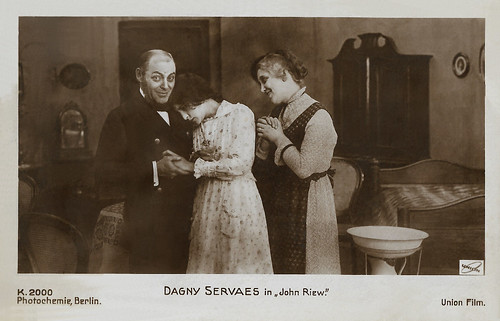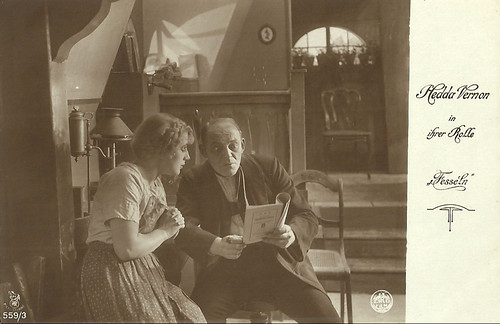
German postcard by Verlag Hermann Leiser, Berlin.

German postcard by Photochemie, no. K. 2000. Photo: Union Film. Dagny Servaes as Anna Seyers in John Riew (Walter Schmidthässler, 1917). The man left of her is Hermann Vallentin, who plays Captain John Riew. The woman on the right is Käthe Dorsch, who plays Anna's mother.

German postcard by Photochemie, Berlin, no. K. 1833. Photo: Willinger, Berlin.
He could play any kind of character
Hermann Vallentin was born in 1872 in Berlin. He was the son of the wood merchant and factory owner Felix Vallentin. Hermann was the brother of the well-known actress and singer Rosa Valetti.
After attending acting classes of Max Grube and Hans Oberländer at the Königliches Schauspielhaus in Berlin, he received his first engagement at the Central Theater in Berlin in the 1895/1896 season. In the next few years, he performed at various theatres in Berlin and Wiesbaden.
From 1914 Vallentin was also a busy film actor. Vallentin did several films for Paul Davidson's company PAGU / Union Film. He played the billionaire Lloyd opposite Friedrich Kayßler and Fritzi Massary in the popular film Der Tunnel/The Tunnel (William Wauer, 1915), made by the PAGU. It was the first of several film adaptations of Bernhard Kellermann's 1913 novel 'Der Tunnel' about the construction of a vast tunnel under the Atlantic Ocean connecting Europe and America.
For Union Film, he also appeared in such films as John Riew (Walter Schmidthässler, 1917) with Dagny Servaes. Later he worked at Friedrich Zelnik's Berliner Filmmanufaktur in films such as Am Scheidewege/At the crossroads (Alfred Halm, 1918) with Mady Christians and Die Nonne und der Harlekin/The Nun and the Harlequin (Alfred Halm, 1918) with Lya Mara. In addition to Zelnik also Fred Sauer often directed him in films at the Berliner Filmmanufaktur.
When Friedrich Zelnik and Lya Mara founded their own film company around 1920, Zelnik-Mara-Film, Valentin continued for a while to act in their films including Der Abenteurer von Paris/The Adventurer of Paris (Fred Sauer 1920). Vallentin also played at other companies, at Eiko-Film opposite Hedda Vernon in Fesseln/Ties (Hubert Moest, 1918), and at May Film opposite Mia May in Wogen des Schicksals/Waves of Fate (Joe May, 1918). Even when shifting to other companies, it was still Alfred Halm who often directed Vallentin, e.g. for PAGU in Die letzten Kolczaks/The Last Kolczaks (Alfred Halm, 1920) with Ellen Richter and for the UFA in the Henny Porten vehicle Die goldene KroneT/he Golden Crown (1920).
Vallentin was a very versatile actor who could play any kind of character. He mostly embodied family patriots, patriarchs, and directors, but also small-scale philistines and - often - police commissioners. On stage, he often worked for the Deutsches Theater under the direction of Max Reinhardt and he performed with his sister Rosa Valetti in such cabarets as the 'Kabarett Größenwahn' (1920) and 'Die Rampe' (1923).

German postcard by Photochemie, Berlin, no. K. 2001. Photo: Union Film. Hermann Vallentin, Dagny Servaes and Käthe Dorsch in John Riew (Walter Schmidthässler, 1917).

German postcard in the Film-Sterne series by Rotophot, no. 559/1. Photo: Eiko-Film. Hedda Vernon and Hermann Vallentin in Fesseln (Hubert Moest, 1918).

German postcard in the Film-Sterne series by Rotophot, no. 559/3. Photo: Eiko-Film. Hedda Vernon and Hermann Vallentin in Fesseln (Hubert Moest, 1918).
Emigration to Palestine
Hermann Vallentin acted in five films by Ewald André Dupont and three by Friedrich Wilhelm Murnau. For Dupont, he played e.g. the lead in Herztrumpf/Hearts Are Trumps (Ewald André Dupont, 1920) opposite Hans Mierendorff and Adele Sandrock, and the crime film Der Mord ohne Täter/Murder Without Cause (Ewald André Dupont, 1921).
For Murnau, he appeared as the district court councillor in the chamber drama Schloß Vogelöd/The Haunted Castle (Friedrich Wilhelm Murnau, 1921), as Herr Binzer in Die Finanzen des Großherzogs/The Grand Duke's Finances (1924), and as a potbellied hotel guest in the classic Der letzte Mann/The Last Laugh (Friedrich Wilhelm Murnau, 1924), starring Emil Jannings.
Vallentin had major parts opposite Lil Dagover and Albert Steinrück in Ludwig Berger's Der Richter von Zalamea/The Mayor of Zalamea (1920), and opposite Conrad Veidt in Urban Gad's Christian Wahnschaffe (1920). He played in several films opposite Leontine Kühnberg including Judith Trachtenberg (Henrik Galeen, 1920). In the early 1920s, Vallentin starred in Die Ratten/The Rats (Hanns Kobe, 1921) opposite Emil Jannings, Hanneles Himmelfahrt (Urban Gad, 1922) with Margarete Schlegel, Der Mann aus Stahl/The Man of Steel (Joseph Delmont, 1922) with Luciano Albertini, Tragödie der Liebe/Tragedy of Love (Joe May, 1923) with Mia May and Emil Jannings, Friedrich Schiller (Curt Goetz, 1923) with Theodor Loos in the title role, and Das Haus am Meer/The House by the Sea (Fritz Kaufmann, 1924), starring Asta Nielsen.
Vallentin had a supporting part in the drama Madame wünscht keine Kinder/Madame Wants No Children (Alexander Korda, 1926) starring María Corda, Harry Liedtke and Maria Paudler. The film was made for the American Fox Film Corporation's German subsidiary. Vallentin played the lead as the circus director in Die letzte Galavorstellung des Zirkus Wolfsohn/The Last Performance of the Circus Wolfson (Domenico Gambino,1928). Then he was once more united with Henny Porten in Lotte (Carl Froehlich, 1928). He also played small parts in Fritz Lang's films Der müde Tod/Destiny (1921), Spione/Spies (1928) and Frau im Mond/Woman in the Moon (1929).
Vallentin easily made the transition to German sound cinema. He appeared in the British-made German-language drama Atlantik (Ewald André Dupont, 1929), a German-language version of the film Atlantic (1929) made at Elstree Studios by British International Pictures. The film was the first fully talking film to be released in Germany, where it was a major hit. It is based on the play 'The Berg' (The Iceberg) by Ernest Raymond which itself was based on the Titanic disaster.
Another early sound film was the satire Der Hauptmann von Köpenick/The Captain from Köpenick (Richard Oswald, 1931), based on the Hauptmann von Köpenick affair in 1906. A poor cobbler named Wilhelm Voigt purchased the second-hand uniform of a Prussian infantry captain. Wearing this, he travelled to the borough of Köpenick and ordered a troop of guardsmen to place themselves under his command. He then declared the town hall to be under military law, ordering the arrest of the mayor and treasurer and confiscating all the funds in the exchequer. Max Adalbert played Wilhelm Voigt, the title figure, and Vallentin played the uniform tailor Adolph Wormser. Vallentin played the title role opposite Anna Sten in Lohnbuchhalter Kremke/Bookkeeper Kremke (Marie Harder, 1930), and had a major part in Meine Frau, die Hochstaplerin/My Wife, the Impostor (Kurt Gerron, 1931) with Heinz Rühmann. He also played bit parts in various films, the last one being the Harry Piel film Sprung in den Abgrund/Jumping Into the Abyss (Harry Piel, 1933).
The takeover of the Nazis ended Hermann Vallentin's film career abruptly - Vallentin was Jewish. In 1933 he emigrated and between 1934 and 1939 he worked on stage subsequently in Basel, Aussig, Prague, Vienna, again Basel, and Zürich. In 1939 he emigrated to Palestine. Since he was not powerful in Hebrew, he had to cease all acting. He gave lectures, read poems, and was a temporary spokesman of German-language news in the Palestine Broadcasting Service (P.B.S.). Hermann Vallentin died in 1945, just a few months after the end of the Second World War, or in 1948 (the sources differ) in Tel Aviv, Israel. He was 73 or 76. His niece Lotte Stein was also an actress.

German postcard by Ross Verlag, no. 97/3. Photo: Alex Schmoll, Berlin / HPF (Henny Porten-Froehlich Produktion). Henny Porten, Ralph Arthur Roberts, Walter Jankuhn, and Hermann Vallentin in Lotte (Carl Froehlich, 1928).

German postcard by Ross Verlag, no. 438/1, 1919-1924. Photo: Becker & Maass, Berlin.

German postcard by Ross Verlag, no. 438/2. Photo: Becker & Maass, Berlin.
Sources: Stephanie D'heil (Steffi-Line - German), Wikipedia (English and German), and IMDb.
This post was last updated on 9 October 2022.
No comments:
Post a Comment